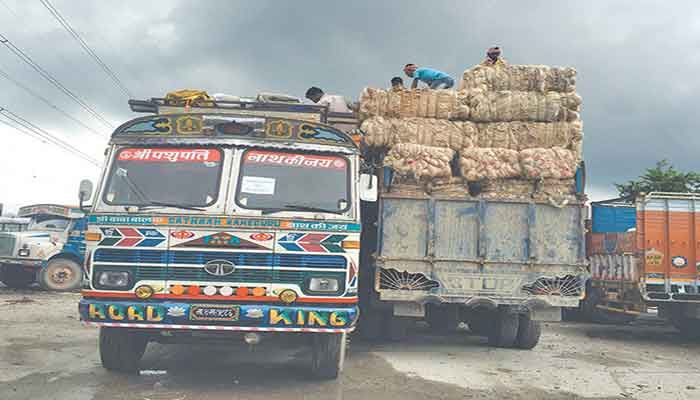
Desk Report
Publish: 20 Dec 2020, 01:51 pm
The proposed agreement gives preferential access to certain products by reducing tariffs but Bangladesh is reluctant to remove other duty charges on imports, officials say.

The first Nepal-Bangladesh preferential trade agreement is slated to be signed by the end of December, but Nepali officials doubt it will happen as key issues remain unresolved.
On October 8, the two countries held a commerce secretary-level meeting on trade and economic cooperation through video conferencing and proposed to sign the deal by the end of this year.
The accord gives preferential access to certain products by reducing tariffs, but it does not abolish them completely.
“The chances of the pact being signed are getting slim,” said an unnamed official of the Ministry of Industry, Commerce and Supplies.
During the meeting in October, Nepal had proposed eliminating the other duty charges and has put this at the top of the agenda as a key condition for signing the preferential trade agreement, according to the official. The other duty charges are normally added as an indirect cost.
“But Bangladesh does not want to eliminate it. Less than two weeks remain for the year to end, and we have not heard from the Bangladeshi side,” said the official who is involved in preparing the agenda from Nepal’s side.
Broom grass, spices, cabbage, tomato, kiwi, avocado, orange, lentil, pickles, snacks, carpet and dairy products are potential exports to Bangladesh.
"As Bangladesh is an initial member of the World Trade Organisation, it is permitted to levy other duty charges. After adding other duty charges on top of the tariffs on goods exported from Nepal, total charges could come up to 130-132 percent," the official said. “But they are not willing to remove it as it would impact the country’s revenue.”
Providing duty-free quota-free access to Bangladeshi products without removing it on Nepali products will not benefit Nepal, according to officials.
“Not much progress has been made on the major issue raised by Nepal. We had planned to conclude the agreement by the end of December, but Bangladesh has not made any move,” he said.
“Nepal will lose by signing the preferential trade agreement without eliminating the ODC,” another official from the ministry told the Post. “Nepal has sent a draft of the conditions, but Bangladesh has not given feedback.”
The meeting led by Baikuntha Aryal, secretary at the Industry Ministry, had primarily focused on tariff, para-tariff and non-tariff barriers in listed products, but the product list under the preferential trade agreement was not finalised.
Bangladesh has not yet signed minutes of the meeting as Nepal has recently sent the finalised minutes, he said.
On November 6-7, the technical committee met to finalise the list of products, text of the preferential trade arrangement and rules of origin. The two sides have exchanged the product lists and are reviewing them.
Bangladesh has been providing duty-free access to 108 Nepali products. Nepal has been urging Bangladesh to expand the list to cover major exportable items such as lentil, tea, coffee, large cardamom, broom, fresh fruits and pashmina, among others. Items not getting duty-free access have difficulties entering Bangladesh.
Earlier, at the commerce secretary-level meeting held in March in Dhaka, the two sides had agreed to sign a preferential trade arrangement by June, but it had to be pushed back because of the coronavirus pandemic.
Nepal is seeking zero tariffs on goods listed under the agreement and the removal of the other duty and charge.
The preferential trade agreement is also one of the issues that the prime ministers of the two countries wanted to finalise as soon as possible, according to government officials.
Bilateral relations between Bangladesh and Nepal have been moving ahead since the founding of Bangladesh in 1971. The two nations are separated by the Siliguri Corridor—a small stretch of territory of the Indian state of West Bengal lying between southern Nepal and northern Bangladesh.
Bilateral trade between Nepal and Bangladesh started to flourish after the Kakarbhitta-Phulbari-Banglabandha transit route came into operation in August 1997.
Nepal was enjoying a trade surplus with Bangladesh till 2013-14, but after that, a drop in the export of lentils led to a trade deficit which it has not been able to shake off.
Source: The Kathmandu Post
Subscribe Shampratik Deshkal Youtube Channel
© 2024 Shampratik Deshkal All Rights Reserved. Design & Developed By Root Soft Bangladesh